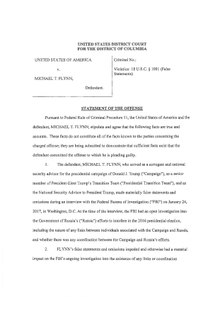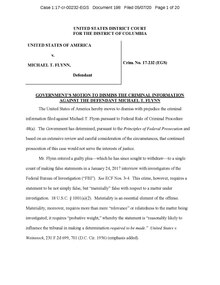United States v. Flynn
[2] Trump's enlistment of Flynn to his campaign also marked a clear schism between Trump's foreign policy and that of the outgoing Obama Administration; whereas relations between the United States and Russia had become strained following conflicts in Ukraine and Syria, Flynn had publicly advocated for the United States and Russia to work more closely together to combat ISIS in 2015[4] and had spoken at a gala honoring the ten year anniversary of the Russian state-owned television network RT."[25] Referring to the Obama administration's measures against the "current issue of the cyber stuff", including that "they're gonna dismiss some number of Russians out of the country",[26] Flynn urged Kisylak to have Russia respond only in a "reciprocal" manner: "don't go any further than you have to.[31] The Flynn-Kislyak conversation transcript was reportedly viewed by Obama advisers who had been briefed on its content by the FBI with suspicion as possibly a secret deal between the incoming team and Moscow, which could have violated the dormant Logan Act which bars unauthorized U.S. citizens from negotiating with foreign powers in disputes with the United States.[32][33][34] On January 12, columnist David Ignatius, writing for The Washington Post, made public that Flynn had called Kislyak on December 29, citing a "senior U.S. government official".[44] During the meeting, the FBI agents discussed with Flynn about his contacts with Kislyak regarding the late December 2019 United Nations Security Council resolution regarding Israeli settlements.[38][39] While the meeting was ongoing, White House aides called for National Security Council lawyer John Eisenberg, who eventually arrived at Flynn's office as the interview was finishing."[50] Former United States Secretary of Defense Robert Gates called the possibility of Flynn being blackmailed "kind of a stretch", while acknowledging that his false statement was "a problem ... that I would tell the president about".[54] On February 9, 2017, The Washington Post broke the story that Flynn had discussed the U.S. sanctions with Kislyak, contrary to the public denials made by the Trump administration, citing "nine current and former officials"."[67] In June, Comey testified before the Senate Intelligence Committee that "I had understood the President to be requesting that we drop any investigation of Flynn in connection with false statements about his conversations with the Russian ambassador in December ...[83] NBC reported that a Turkish businessman named Reza Zarrab, who was picked up in 2016 by US authorities in Miami on Iranian sanctions violations and money laundering charges, was offering evidence against Flynn.[94] In the agreement, Flynn pleaded guilty to one felony count of "willfully and knowingly making materially false statements and omissions to the Federal Bureau of Investigation" about conversations with the Russian ambassador to the United States, Sergey Kislyak, "in violation of 18 U.S.C."[109][44] Sullivan, who had a history of skepticism about government conduct, including dismissing a corruption case against senator Ted Stevens due to prosecutorial misconduct,[110] rebuked Flynn at his December 18, 2018 sentencing hearing.Citing evidence not released to the public, the judge told him, "arguably you sold your country out",[111][112] and warned, "I cannot assure that if you proceed today you will not receive a sentence of incarceration."[113] Flynn restated his guilty plea, and acknowledged to Sullivan he was aware that lying to federal investigators was a crime at the time of his initial FBI interview in January 2017.The newly unredacted information also showed that members of the Trump campaign discussed contacting WikiLeaks about the release of emails and "potential efforts to interfere with the SCO's investigation.[135][133][136] In August 2019, Flynn's attorneys filed a motion to hold the prosecutors in contempt for "malevolent conduct", accusing them of withholding material that benefited his case to cause him to plead guilty.They alleged that parts of the federal government had attempted to "smear" him as a Russian agent, "or the victim of a criminal leak or other abuses related to classified intercepts of his calls with Kislyak".[138] On December 16, 2019, after a review of possible case related findings in the Michael Horowitz report, Sullivan rejected the assertions of FBI entrapment and prosecutorial malfeasance, setting his sentencing date for January 28, 2020.[150] On February 10, 2020, Flynn's sentencing was postponed indefinitely, to allow both sides to prepare arguments in response to his claim that his previous lawyers violated his constitutional rights by providing inadequate legal counsel.[155] On May 12, U.S. District Judge Emmet G. Sullivan ordered a hold on the Justice Department's intent to drop charges, saying he expects that independent groups and legal experts will wish to intervene."[160] Two private appellate attorneys and former Watergate prosecutors, William Taylor and Lawrence Robbins, filed an amicus brief on May 22, noting that the Justice Department had relied on a single 1956 DC Circuit case Weinstock v. United States[161] to make its argument that Flynn's statements, even if false, were not material.[175][177] The panel held, "In this case, the district court's actions will result in specific harms to the exercise of the Executive Branch's exclusive prosecutorial power.Lederman also noted that the other majority judge, Karen Henderson, had stated in a 2015 case, "mandamus is inappropriate in the presence of an obvious means of review: direct appeal from final judgment.[181]In response to the higher court ruling, Judge Sullivan issued an order staying upcoming deadlines for replies and canceling the July 16 hearing date, but did not address the DOJ's motion further.[187] On July 30, the full court agreed to hear the case, vacating the June 24 ruling, scheduling oral arguments for August 11, and advising the parties to "be prepared to address whether there are 'no other adequate means to attain the relief' desired."."[194] In the en banc hearing, the DC Circuit on August 31 denied the writ of mandamus, as well as the request to assign the case to a different judge, allowing Sullivan to rule on the Justice Department motion to drop the prosecution.Four days later, Strzok's attorney wrote to Sullivan that he believed the notes had been altered with the insertion of dates that in one case made it appear a White House meeting had occurred earlier than it actually did.[205] Flynn's attorneys also asserted in their filing that "This hideous abuse of power and travesty of justice has only been exacerbated by the unprecedented and baseless rulings of this court, and it should not continue another day.[209] Representing the Justice Department, Kenneth Kohl, the acting principal assistant U.S. attorney in Washington, stated, "We're completely unafraid to get in the weeds and address the specifics as to why we thought we needed to dismiss this case," a reversal of Jeffrey Wall's statement to the full DC Circuit Court in August that no such explanation would be forthcoming.[206] Gleeson argued that the Justice Department's "reasons are so patently pretextual that the government feels the need to keep coming up with more of them" and urged Sullivan to proceed with sentencing, stating "If the executive wants to take Michael Flynn off the hook, he can pardon him.






United States District Court for the District of ColumbiaMichael FlynnWrit of MandamusUnited States Court of Appeals for the District of Columbia CircuitRudolph ContrerasEmmet G. SullivanBrady v. MarylandRussian interference in the 2016 United States electionsSpecial Counsel investigation (2017–2019)Making false statementscriminallieutenant generalUnited States Armed ForcesPresident-electDonald TrumpNational Security AdvisorpleadedFederal Bureau of InvestigationRussian AmbassadorSergey KislyakSpecial Counsel investigationplea dealplea bargainSpecial CounselRobert MuellerrecusedCovington and BurlingSidney PowellBrady materialevidencebad faithbreachedUnited States Department of Justicemotion to dismisswith prejudiceprove beyond a reasonable doubtmateriallyamicusJohn GleesonpetitionCircuit Court of Appeals for the District of Columbiavacateden bancUnited States ArmyDefense Intelligence AgencyTrump campaignVice PresidentObama AdministrationRussiaUkraineBarack ObamaSeptember 11 attacksCrossfire Hurricane (FBI investigation)Crossfire HurricaneA review of the Crossfire Hurricane investigationInspector General for the Department of JusticeMichael HorowitzUnited Nations Security CouncilCBS NewsJared Kushnerinterference in the 2016 U.S. presidential campaignExecutive OrderDominican RepublicMar-a-LagoFloridaK.T. McFarlandSteve BannonReince PriebusForeign Minister of RussiaSergey LavrovPresident of RussiaVladimir PutinLogan ActDavid IgnatiusSean SpicerMike PenceThe Wall Street JournalJames ComeyE. W. PriestapAndrew McCabePeter StrzokNational Security CouncilJohn EisenbergSally YatesUnited States Secretary of DefenseRobert GatesKaren DeYoungThe Daily CallerDismissal of James ComeyMueller special counsel investigationdismissed ComeyWhite HouseSessionsSergei KislyakRod RosensteinAttorney GeneralDirector of the FBI2016 presidential campaignHouse Intelligence committeesSenate Intelligence CommitteesubpoenaFifth Amendmentself-incriminationPentagon inspector generalNBC NewsBijan KianReza ZarrabKamil Ekim AlptekinFethullah GülenU.S. District Courtfelonyfalse statementsForeign Agents Registration ActEmmet SullivanTed StevensentrappedMueller ReportJohn DowdWikiLeaksCovington & BurlingBill BarrJeffrey JensenBijan Rafiekian trialTurkeyGülen supportersBijan Rafiekian